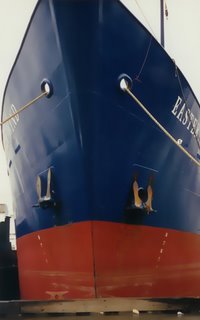Bottom trawling and Sector Management

You don't clear-cut the forest to get the deer, so why decimate the bottom ecology to get at a single species? We never stop and think about what a five ton 'canyon buster' trawl net is actually doing down there. Thankfully, they just closed some areas in the Aleutians that were losing their coral forests real fast.
My favorite picture of the kind of boats that are "hit and run" fishing in Alaska. They don't even fit in the harbors up there.
I worry that in the rush to go after the recovering stocks of Pacific Ocean perch off Alaska, there is going to be a slaughter of innocent creatures. Oh, it's just by-catch you say. I know collateral damage is acceptable in war, who's going to stop it, the enemy? But collateral damage in the fisheries can be prevented. The powers-that-be just don't want to. The target species is most efficiently harvested with trawl gear, so go jump in a lake.
And what about that by-catch anyway? What is it? It's other species that other fishermen target at different times and it comes out of what they can catch later. And given the chance, smaller boats could probably catch "species A" just fine with different types of gear that don't destroy the bottom ecology. Maybe that's what happened the first time they wiped out POP, the food chain got caught up in the dragnet too.
I know they are a long-lived critter, but hey, how's a rock-fish going to make it without his forest? Maybe the question before the North Pacific Fisheries Management Council should be, "Should we bottom trawl at all in the Gulf of Alaska?" One Kodiak dragger testified that he quit bottom trawling because of the greed he saw in a lot of fishermen. That's where the flurry of pro-ratz letters to the editor in the Kodiak Daily Mirror came from; the greedy ones that want a golden parachute. Ecosystem management is the key. "Remember the Klamath."
Bottom trawling for POP catches every other kind of rock-fish, and these species can't take that kind of fishing pressure. And dragging for flat-fish yields an unearthly amount of halibut, that is now worth a fortune, while the target species is next to worthless. You need an attorney to decipher NPFMC Motion 80 on by-catch. I can't say that I've even read all eight pages.
I can see where all this nonsense is leading, straight into court. Just like in Oregon. A judge had to take over the salmon rebuilding efforts on the Columbia because NOBODY could get it right. And there where a dozen or so entities who thought they knew best, and who's influence ebbed and flowed, in the 70 odd years of trying, since the Spring Hogs were wiped out.
And, I don't have to remind that a lobbyist for the big rape and pillage contingent is running things at the NPFMC. Take a look at what a community did back East to take the bull by the horns.
“Things are a lot different from the way they were three years ago,” Parker said, reflecting on recent changes and challenges. Ineffective management and continuing depletion of resources are “combining in ways that are harmful to our local fishing communities.” That’s why sectors make sense. Parker calls them “one of the only bright spots on the horizon” in fisheries management. Sector management makes the most sense if commercial fishing is going to remain a viable industry in New England."


<< Home